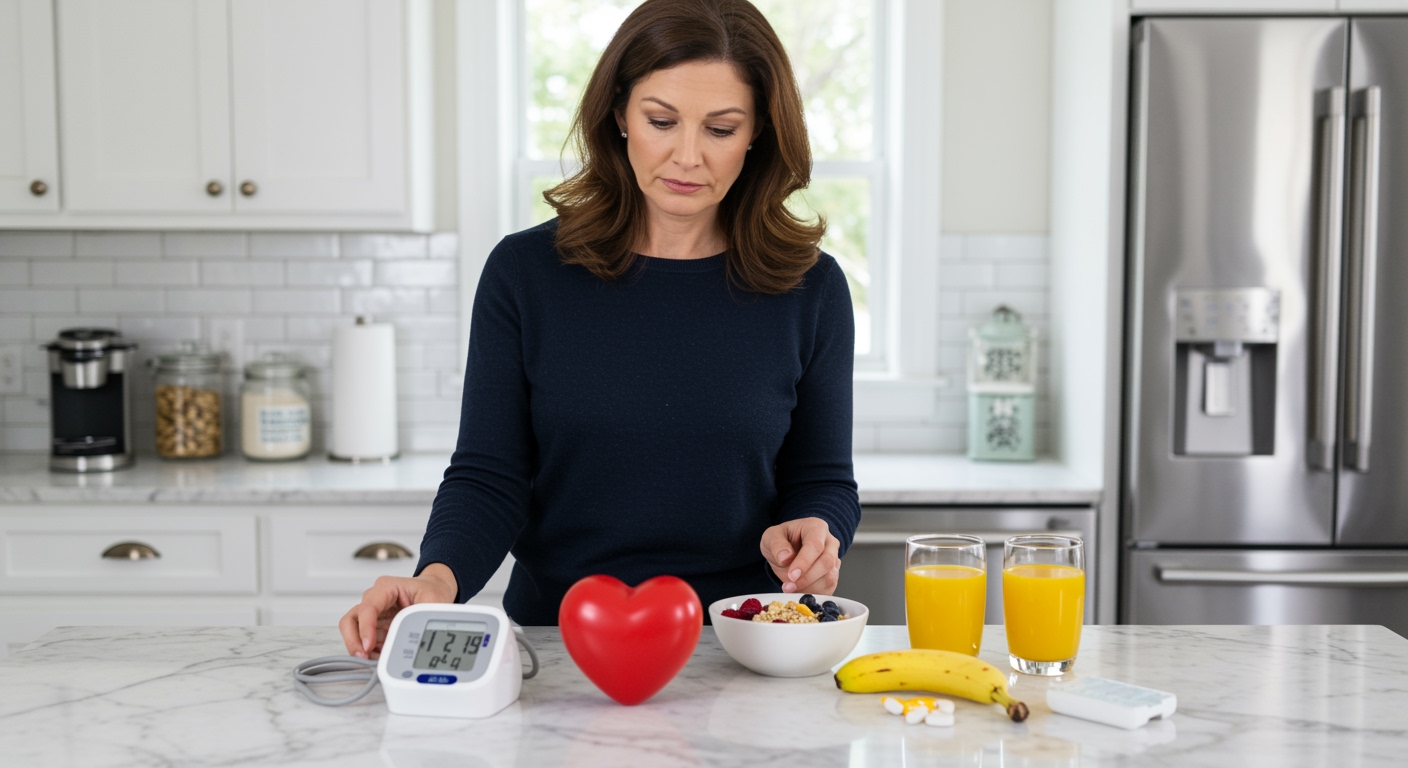✪ Key Takeaway: People with high blood pressure should eat breakfast regularly as skipping increases blood pressure spikes.
Introduction
Your blood pressure monitor shows those dreaded high numbers again this morning.
You might wonder if skipping breakfast could help lower those readings or if eating might make things worse for your cardiovascular system.
Hi, I’m Abdur, your nutrition coach and today I’m going to explain exactly how breakfast affects your blood pressure and why timing matters more than you think.
What Happens When You Skip Breakfast With High Blood Pressure?
Skipping breakfast creates a dangerous cascade of events in your cardiovascular system.
Your body releases stress hormones like cortisol and adrenaline when you fast for extended periods.
These hormones cause your blood vessels to constrict and your heart to pump harder.
Research shows that people who skip breakfast regularly have 27% higher risk of developing heart disease.
Your blood sugar drops dramatically overnight, and without breakfast, it continues falling.
This triggers your body to release glucose from stored sources, causing blood pressure spikes that can last for hours.
✪ Fact: Breakfast skippers show 30% higher morning blood pressure readings compared to regular breakfast eaters.
How Does Breakfast Timing Affect Your Blood Pressure?
Your body follows a natural circadian rhythm that affects blood pressure throughout the day.
Blood pressure naturally rises in the morning as your body prepares for daily activities.
Eating breakfast within two hours of waking helps stabilize this morning surge.
The nutrients from your morning meal signal your body to shift from fasting mode to fed mode.
This transition helps regulate hormone production and reduces the stress response that elevates blood pressure.
Studies indicate that eating breakfast before 9 AM provides the most cardiovascular benefits for people with hypertension.
Late breakfast eaters still experience some morning blood pressure elevation because their bodies remain in stress mode longer.
✪ Pro Tip: Set your alarm 15 minutes earlier to ensure you have time for a proper breakfast before 9 AM.
What Should People With High Blood Pressure Eat For Breakfast?
The right breakfast choices can actively help lower your blood pressure throughout the day.
Focus on foods rich in potassium, magnesium, and fiber while limiting sodium and refined sugars.
Oatmeal topped with fresh berries provides soluble fiber that helps reduce cholesterol and blood pressure.
Greek yogurt with nuts delivers protein and healthy fats that stabilize blood sugar and prevent pressure spikes.
Bananas, spinach, and avocados are potassium powerhouses that counteract sodium’s blood pressure raising effects.
Avoid processed breakfast foods like pastries, sugary cereals, and bacon which contain high sodium and trans fats.
These foods cause rapid blood sugar swings that stress your cardiovascular system and worsen hypertension.
✪ Note: Aim for 400-500mg of potassium at breakfast to help offset sodium from other meals throughout the day.
Can Intermittent Fasting Work With High Blood Pressure?
Intermittent fasting can be risky for people with uncontrolled high blood pressure.
Extended fasting periods trigger stress hormone release that can cause dangerous blood pressure spikes.
However, some research suggests that controlled fasting under medical supervision might benefit certain individuals.
The key difference lies in gradual adaptation versus sudden breakfast elimination.
People with well-controlled blood pressure may tolerate shorter fasting windows better than those with severe hypertension.
Never attempt intermittent fasting without consulting your doctor if you take blood pressure medications.
Your medication timing and effectiveness can be significantly affected by meal patterns and fasting periods.
✪ Pro Tip: If you want to try fasting, start with a 12-hour window and monitor your blood pressure closely.
How Long After Eating Does Breakfast Affect Blood Pressure?
Breakfast begins affecting your blood pressure within 30 minutes of eating.
Your digestive system activates the parasympathetic nervous system, which promotes relaxation and lowers blood pressure.
Blood flow increases to your digestive organs, which can temporarily reduce pressure in other blood vessels.
The peak blood pressure lowering effect typically occurs 1-2 hours after eating a balanced breakfast.
This effect can last for 4-6 hours, helping maintain stable readings until your next meal.
However, high-sodium or high-sugar breakfasts can cause the opposite effect within the same timeframe.
These foods trigger inflammatory responses that increase blood pressure for several hours after eating.
✪ Fact: A heart-healthy breakfast can lower systolic blood pressure by 5-10 points within two hours of eating.
The Bottom Line
People with high blood pressure should definitely eat breakfast regularly to maintain stable cardiovascular health.
Your morning meal is not just food, it is medicine for your blood vessels when chosen wisely and timed properly.
I would love to hear about your breakfast experiences and how they affect your blood pressure readings, so please share your thoughts in the comments below.
References
At NutritionCrown, we use quality and credible sources to ensure our content is accurate and trustworthy. Below are the sources referenced in creating this article:
- Hackensack Meridian Health: When Is the Best Time to Eat Breakfast for Lower Blood Pressure
- Health Match: Best Breakfast for High Blood Pressure
- American Heart Association: Dietary Guidelines for Americans
- PMC: Breakfast Consumption and Cardiovascular Health
- PMC: Meal Timing and Cardiovascular Disease





